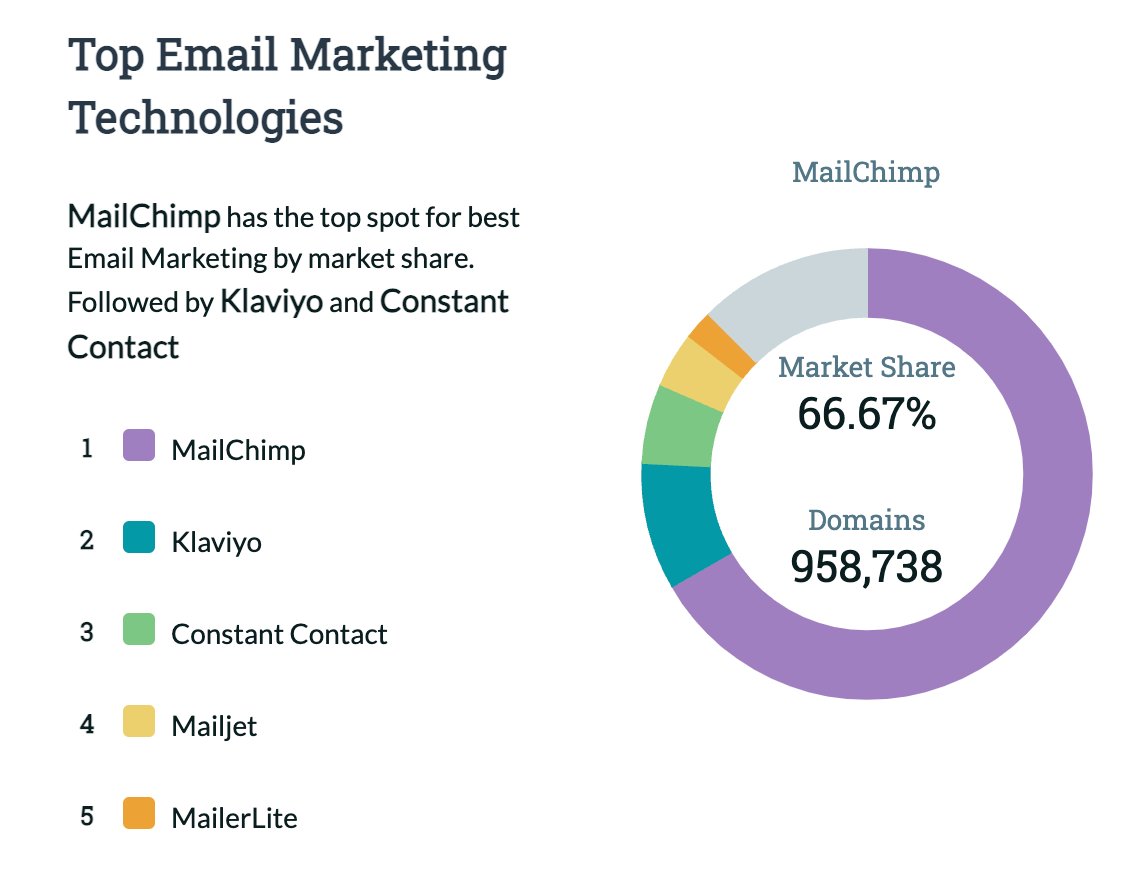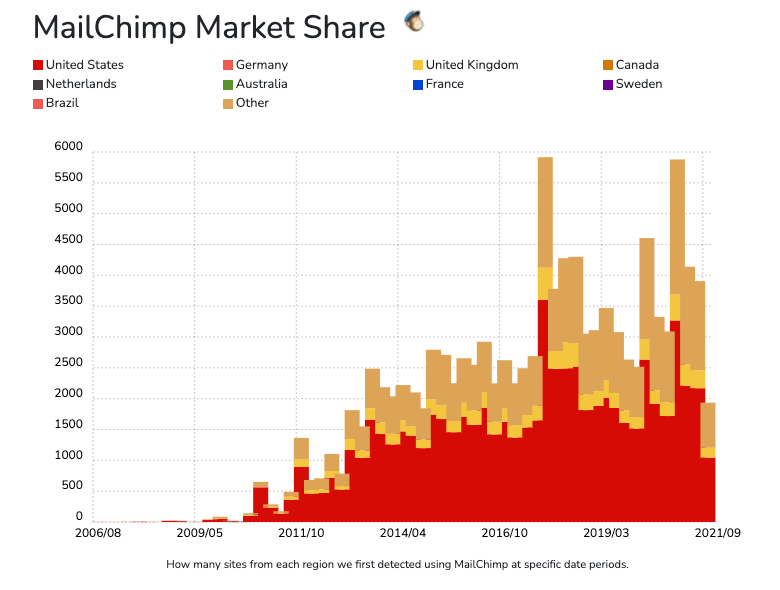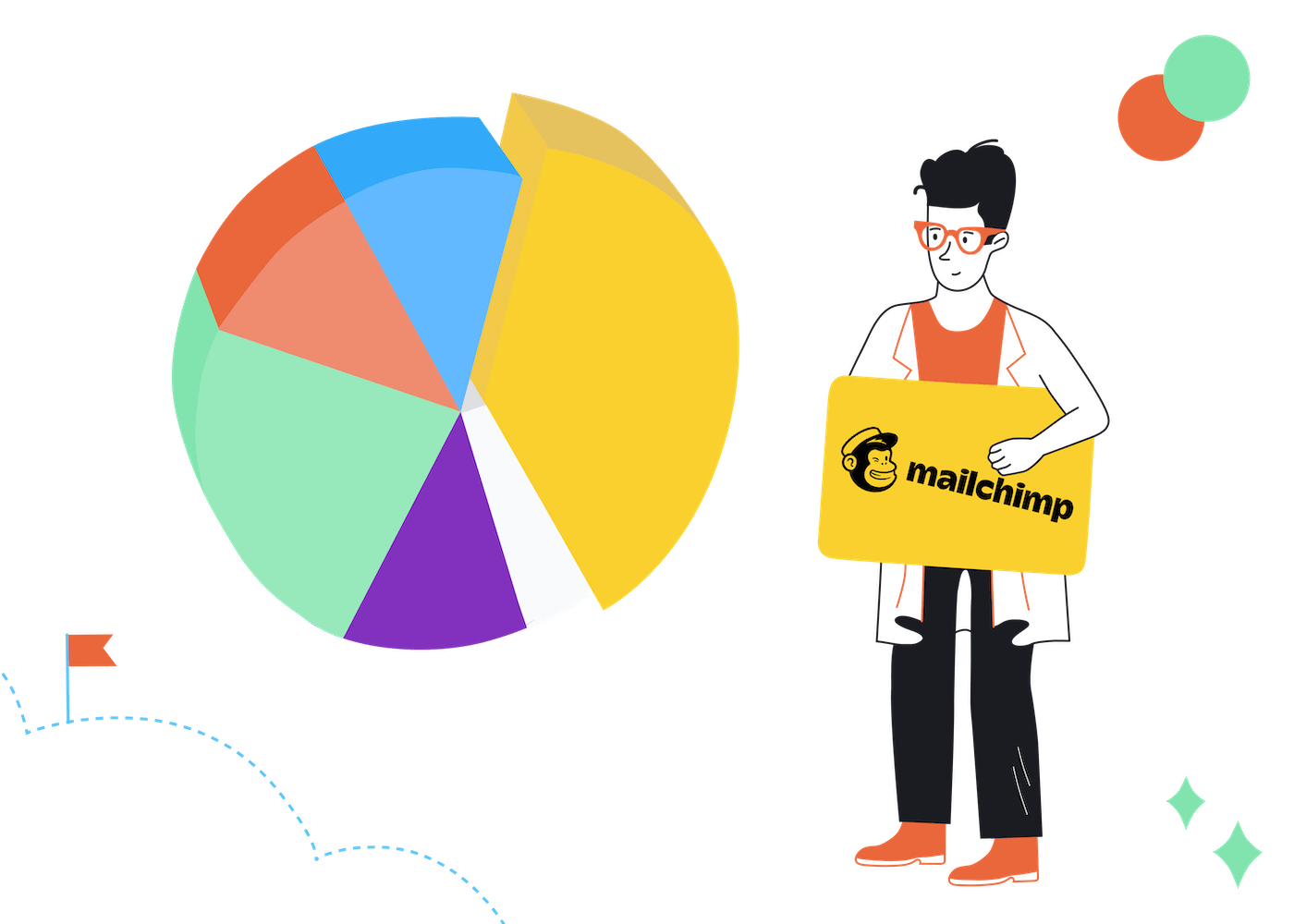Everyone has heard of Mailchimp. It is literally the most popular email marketing platform on the market. But I guess if you’ve found your way here, you want to know just how popular.
We’ve been keeping a close eye on Mailchimp over the years, reviewing new features such as landing pages, changes in pricing and the product as a whole in our Mailchimp review – it’s certainly an interesting company to watch evolve.
Read on to find out all the juicy statistics on the world’s (but mainly America’s) most used email marketing platform.
How Much of The Email Provider Market Does Mailchimp Own?
According to Datanyze, Mailchimp owns 66.67% of the email market share. That's about 6% less than the last time we updated this article in January 2022.
But why are they losing market share? The most likely explanation is that, after having reduced the allowances of their famous free plan several times now, people are switching to other free email marketing services.

Source: Datanyze
Its biggest competitor, and email marketing veteran, Constant Contact, owns just 5.7%, around 3% less than it did it 2020.
Considering that Constant Contact has been around since 1995, you’d think that they’d have the experience to stay ahead of the game, but no.
As we see time and time again, it’s very easy to get stuck in your ways as a company. So what did Mailchimp do that Constant Contact didn’t? Well, as you can see in this Mailchimp vs Constant Contact comparison, quite a lot. Jump ahead to find out how Mailchimp got so big.
This chart, taken from BuiltWith, gives you an idea of how Mailchimp has grown over the years, acquiring the largest portion of the email provider market share:

How Many Global Searches Does it Get a Month?
These figures are taken from Ahrefs, and, of course, they will change slightly every month, but it’s interesting to look at these statistics against the market share percentage and that of Mailchimp’s competitors. We’ve also compared 2020’s figures with Jan 2022’s.
Search Volume for March 2020

- Global 4.1 M
- US 1.2 M
Search Volume for Jan 2022

- Global 1.9 M
- US 405 K
Search Volume for Mar 2023

- Global 2.2 M
- US 535 K
Important note about the drop in searches: If you recall (and I’m sure you do), March 2020 marks the start of the Covid-19 pandemic. As a result, the great majority of businesses had to notify their customers about changes regarding store closures, deliveries, new store policies, online services, etc., and the best way to do so was via email. This massive uptake in email marketing is clearly shown in the data from March 2020.
Who Are Mailchimp’s Competitors?
As I’ve mentioned above, Mailchimp’s biggest competitor is Constant Contact, which owns 5.08% of the email market (according to Datanzye) – a fraction of what Mailchimp owns. In fact, the top 5 Mailchimp competitors only amount to 16.85% of the email marketing market share. So, yeah, I think it’s fair to say that Mailchimp is in a league of its own.
| EMAIL MARKETING PLATFORM | MARKET SHARE (March 2020) |
MARKET SHARE (Jan 2022) |
MARKET SHARE (Mar 2023) |
|---|---|---|---|
| Mailchimp | 62.23% | 72.68% | 66.67% |
| Constant Contact | 8.69% | 5.08% | 5.73% |
| Klaviyo | 1.43% (data from June 2020) |
4.79% | 9.12% |
| Campaign Monitor | 3.30% | 1.62% | 1.78% |
| AWeber | 2.55% | 2.37% | 1.41% |
| Mailjet | 2.54% | 2.99% | 3.98% |
>> Find out which big brands use Mailchimp as their email marketing service in our ecommerce email marketing statistics study.
Mailchimp Annual Report Statistics
In Mailchimp’s 2020 annual report, it states the following statistics for that year:
- The total number of active users was 14M
- Almost 14K people signed up for a Mailchimp account every day
- 333,635,013,935 emails were sent out!
- 55 different languages were used in emails sent through Mailchimp
- Some of the biggest companies that use Mailchimp include Vimeo, TED, The North Face and New Belgium Brewing.
Unfortunately, Mailchimp hasn't released an updated version of their annual report yet as of March 2023.
Mailchimp Statistics 2019 vs 2020
| Dec 2019 | Dec 2020 | |
|---|---|---|
| Total number of active users | 12.3M | 14M |
| People signing up for a Mailchimp account every day | 11K | 14K |
| Ecommerce orders generated by Mailchimp users | 839.5M | 515.3M |
How Much Money Are Mailchimp Users Making?
According to Mailchimp, in 2020, their customers had over 515.3M ecommerce orders, which resulted in $61 billion in revenue.
They also note that over $314.6 million was generated from customers’ abandoned cart automations.
In light of these figures, it’s worth noting the power of email marketing and why it really needs to be made good use of by marketers and business owners, especially small business owners and entrepreneurs. We created a handy ebook for all those wanting to get started with or improve their email marketing, you can download it here.
Mailchimp Revenue Over The Years
These are estimates, taken from various sources, but it gives you an idea.
| Year | Revenue |
|---|---|
| 2022 | $762 million |
| 2021 | Undisclosed |
| 2020 | $800 million |
| 2019 | $700 million |
| 2018 | $600 million |
| 2017 | $525 million |
| 2016 | $400 million |
| 2015 | $280 million |
Sources: AdAge, TechCrunch, Forbes, Inc.com, NYTimes
Who Owns Mailchimp?
Mailchimp was set up by Ben Chestnut and Mark Armstrong in 2001 – yep, that’s right, Mailchimp is 22 years old.
It currently has a total of 1,200 employees and offices in Atlanta, Brooklyn, Oakland and Vancouver.
In 2021, Mailchimp was bought for the sum of $12 billion in cash and stocks by financial software company Intuit.
How Did Mailchimp Get so Big?
If you’re interested in business, email marketing, marketing in general, or software development, you might be asking yourself How did Mailchimp get so massive? I’ve certainly asked myself the same question.
We can find part of the answer in founder Ben Chestnut’s comments to the New York Times where he explains that Mailchimp’s success stems from the fact that it had “a proximity to its customers that its competitors lacked.”
He says that as Mailchimp “was itself a small business, it understood what those businesses wanted out of their marketing tools. Its offerings were cheaper, it added features more quickly, and it allowed greater customizations to fit customers’ needs.”
Combine that with a lovable brand (namely Freddie the chimp), very generous freemium accounts and a great email marketing strategy that delighted customers, and you’ve got yourself 72% of the email market share! (To put it simply.)
With its informal tone and easy-to-use software, Mailchimp turned email marketing on its head. With Mailchimp, something that was reserved for techies and large corporations was now:
- Simple
- Friendly
- Free (in many cases)
- And even fun!
Heck, it even gives you hi-fives for sending out a campaign and has been known to send you (weird) Mailchimp ‘swag’ like crocheted hats for your pet. Check out Mailchimp’s cat hats below:

Source: https://amplifier.com/case-studies/mailchimp
Mailchimp Market Share: Final Thoughts & Look to The Future
So there you have it, everything you need to know about Mailchimp’s market share.
If there were any doubts about who owns email, it is most certainly Mailchimp. The question is whether they'll stay at the top long-term. Within a year, they lost about 6% of their market share, it'll be interesting to see if their revenue is going to decline too.
So what’s next for the email marketing titan?
What new features will it be bringing out in 2023 and the coming years?
Will it throw another curveball at us as it did in May 2019 with its new pricing model?
Keep an eye on our Mailchimp review where we’ll be covering all of the above.
If you're in need of an email marketing service, you might like to check out these excellent Mailchimp alternatives.
We keep our content up to date
17 Mar 2023 - Update for 2023
18 Jan 2022 - General update with figures for 2022
Our Methodology
This article has been written and researched following our EmailTooltester methodology.
Our Methodology

